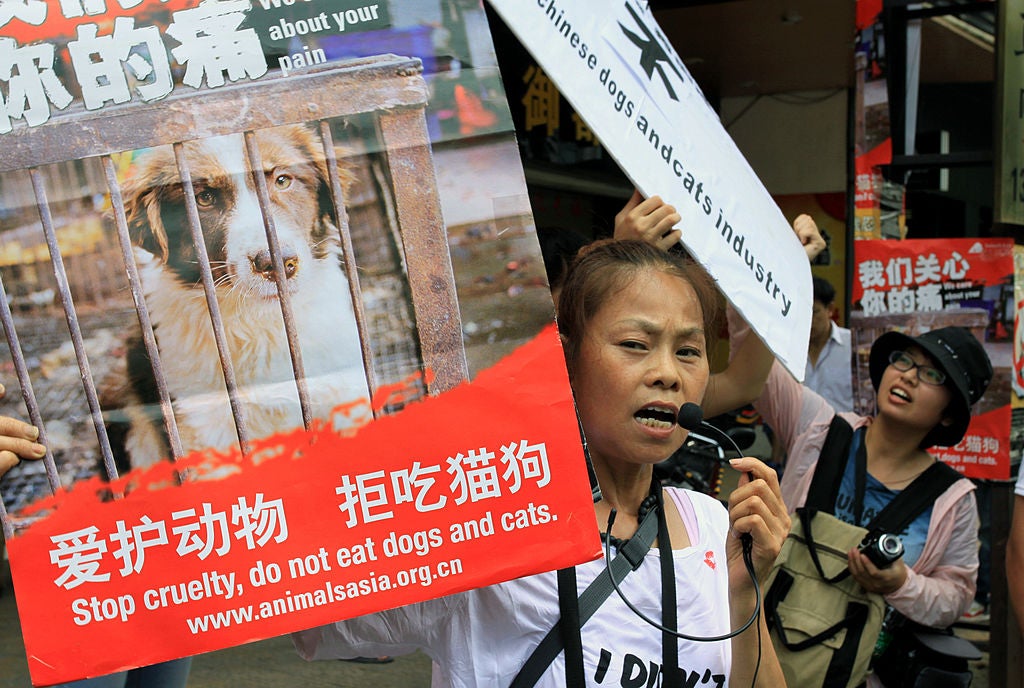No, the Yulin Dog Meat Festival has not been cancelled – here's why it will never go away
When the western world starts to take opposition to cultural events in China, it’s a very personal affair

Your support helps us to tell the story
From reproductive rights to climate change to Big Tech, The Independent is on the ground when the story is developing. Whether it's investigating the financials of Elon Musk's pro-Trump PAC or producing our latest documentary, 'The A Word', which shines a light on the American women fighting for reproductive rights, we know how important it is to parse out the facts from the messaging.
At such a critical moment in US history, we need reporters on the ground. Your donation allows us to keep sending journalists to speak to both sides of the story.
The Independent is trusted by Americans across the entire political spectrum. And unlike many other quality news outlets, we choose not to lock Americans out of our reporting and analysis with paywalls. We believe quality journalism should be available to everyone, paid for by those who can afford it.
Your support makes all the difference.The Independent has decided to republish this piece from last year in light of the Yulin Dog Festival 2018
Every year come the summer solstice, images of the Yulin Dog Festival swamp social media feeds. Angry animal activists share their rage at the mistreatment of dogs cramped into small cages, destined for the dinner plate as part of a festival aimed to “celebrate” the canine.
In 2016, it’s thought that some 10,000 dogs were killed and eaten during the festival in southern China.
This year, the Yulin Dog Festival is set to start on 21 June and will last until around 30 June. Last summer, foreign animal activists claimed that these horrific scenes were finally history. The sale of dog meat in the run up to the festival in 2017 was to be banned. It was marked as a step in the right direction.
But can this barbaric festival really be stopped?
It seems not.
Culture is one of the major arguments by locals wanting the festival to go ahead. Ask many Chinese people what they are proud of about their country and it will be their culture.
China is home to one of the world’s oldest civilisations and there are so many cultural things for China to be proud of, from Peking Opera and the Great Wall to the invention of the bicycle. So when the western world starts to take opposition to cultural events in China, it’s a very personal affair.
As shown by China’s state media, who following criticism of the dog festival every year, release opinion pieces lashing out at other countries’ animal rights records. In 2016, the People’s Daily Online released an opinion piece blaming western cultures for the killing of whales and attacked countries in the west demanding that they take a look at their own cultural values before criticising others.
It’s not just state media too – people on social media have also attacked events in the west such as bullfighting in Spain and seal hunting in Canada.
The Shut Down the Yulin Dog Meat Festival! petition on Change.org has over three million signatures. But many locals see this as an attack from the west on their way of living. Residents in Yulin have become enraged and in some way defiant about holding the festival. Western interference is a major hurdle to overcome when trying to ban the occasion. Many people especially in Yulin see it as a personal attack – it’s the western world telling them what they can and can’t eat.
Another way in which the ban would be problematic is that many of the dog meat sellers are peasants or farmers on a low income. These people rely on dog meat to raise money for their families.
Guangxi province, the region in which the festival is held, is one of the country’s poorest provinces. The festival draws in big money for local meat traders. If it were to be banned there would need to be an alternative way of earning money for these farmers.
Not only this, work needs to be done to help change people’s attitudes in a country where animal laws are lacking. In the case of Yulin, it is the older generation that are the problem – they believe that eating dog meat is a part of their culture and that eating it benefits their health.
To counter this, animal rights charities have been working hard to ensure that young people in China are aware of the need for animal rights. In fact, support for the Yulin festival is very low in the younger generation – from personal conversations with local animal activists, the majority of these are young people who are becoming increasingly involved in fighting for animal rights in the country.
A poll in 2016 by the Humane Society International even found that 64 percent of people in China want the festival to end.
However, the festival is deeply ingrained in the culture of those in Yulin and it would take at least a generation to eradicate or change China’s attitudes towards the dog meat festival. Until then, it’s unlikely that the festival will be stopped.
Join our commenting forum
Join thought-provoking conversations, follow other Independent readers and see their replies
Comments